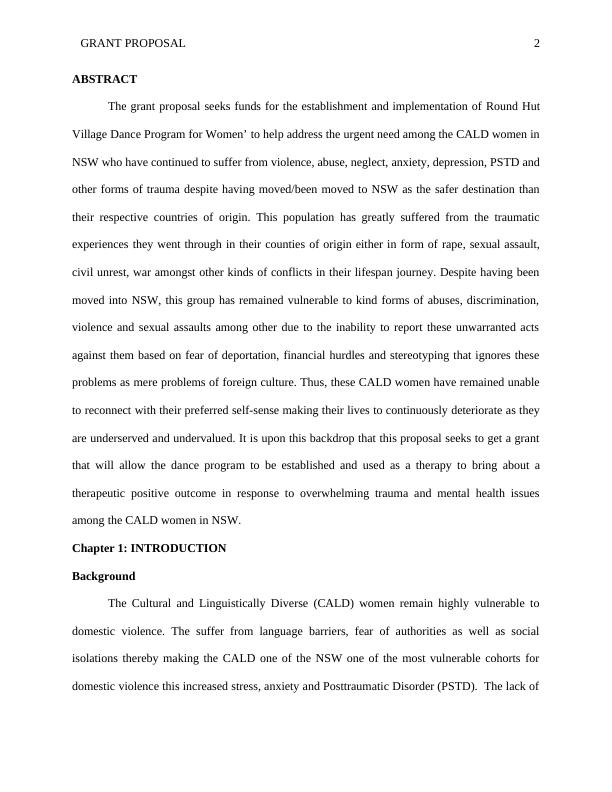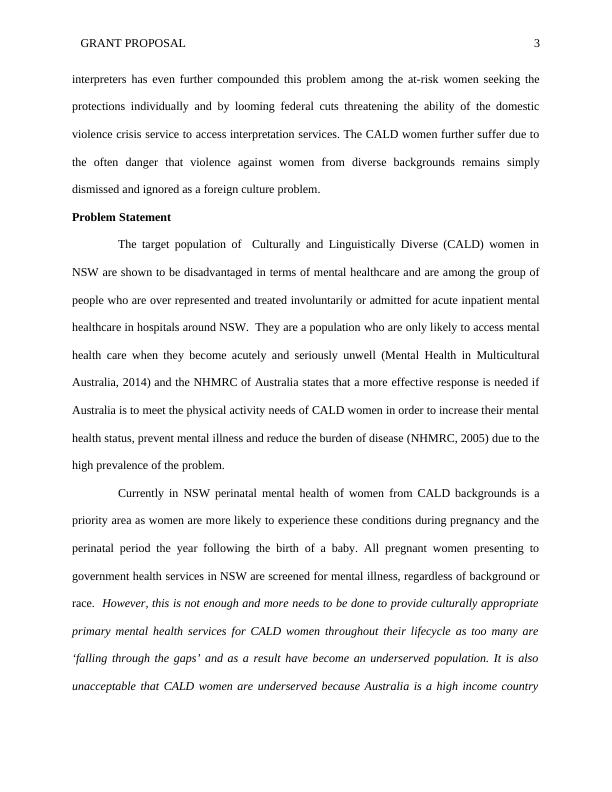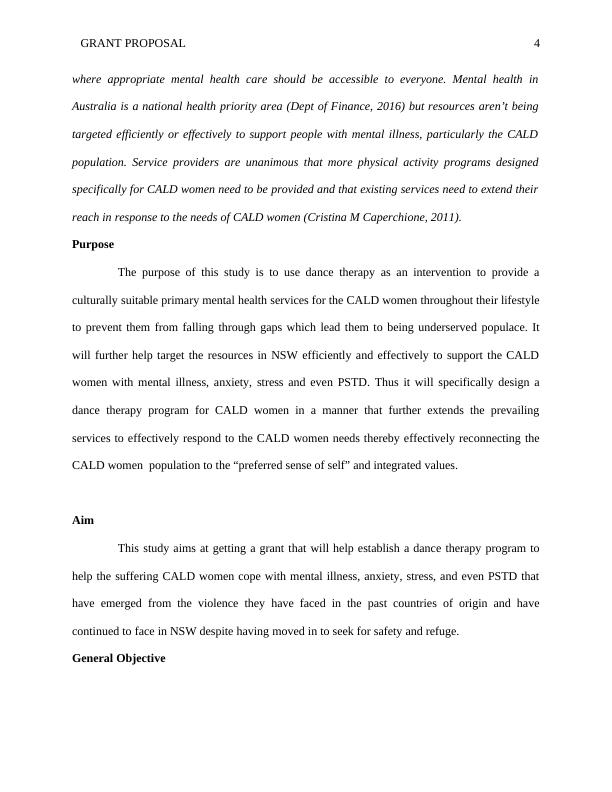Ask a question from expert
The Cultural and Linguistically Diverse (CALD)
20 Pages5520 Words75 Views
Added on 2020-04-21
The Cultural and Linguistically Diverse (CALD)
Added on 2020-04-21
BookmarkShareRelated Documents
Running head: GRANT PROPOSAL 1Grant ProposalNameInstitution

GRANT PROPOSAL 2ABSTRACTThe grant proposal seeks funds for the establishment and implementation of Round HutVillage Dance Program for Women’ to help address the urgent need among the CALD women inNSW who have continued to suffer from violence, abuse, neglect, anxiety, depression, PSTD andother forms of trauma despite having moved/been moved to NSW as the safer destination thantheir respective countries of origin. This population has greatly suffered from the traumaticexperiences they went through in their counties of origin either in form of rape, sexual assault,civil unrest, war amongst other kinds of conflicts in their lifespan journey. Despite having beenmoved into NSW, this group has remained vulnerable to kind forms of abuses, discrimination,violence and sexual assaults among other due to the inability to report these unwarranted actsagainst them based on fear of deportation, financial hurdles and stereotyping that ignores theseproblems as mere problems of foreign culture. Thus, these CALD women have remained unableto reconnect with their preferred self-sense making their lives to continuously deteriorate as theyare underserved and undervalued. It is upon this backdrop that this proposal seeks to get a grantthat will allow the dance program to be established and used as a therapy to bring about atherapeutic positive outcome in response to overwhelming trauma and mental health issuesamong the CALD women in NSW. Chapter 1: INTRODUCTION BackgroundThe Cultural and Linguistically Diverse (CALD) women remain highly vulnerable todomestic violence. The suffer from language barriers, fear of authorities as well as socialisolations thereby making the CALD one of the NSW one of the most vulnerable cohorts fordomestic violence this increased stress, anxiety and Posttraumatic Disorder (PSTD). The lack of

GRANT PROPOSAL 3interpreters has even further compounded this problem among the at-risk women seeking theprotections individually and by looming federal cuts threatening the ability of the domesticviolence crisis service to access interpretation services. The CALD women further suffer due tothe often danger that violence against women from diverse backgrounds remains simplydismissed and ignored as a foreign culture problem. Problem StatementThe target population of Culturally and Linguistically Diverse (CALD) women inNSW are shown to be disadvantaged in terms of mental healthcare and are among the group ofpeople who are over represented and treated involuntarily or admitted for acute inpatient mentalhealthcare in hospitals around NSW. They are a population who are only likely to access mentalhealth care when they become acutely and seriously unwell (Mental Health in MulticulturalAustralia, 2014) and the NHMRC of Australia states that a more effective response is needed ifAustralia is to meet the physical activity needs of CALD women in order to increase their mentalhealth status, prevent mental illness and reduce the burden of disease (NHMRC, 2005) due to thehigh prevalence of the problem. Currently in NSW perinatal mental health of women from CALD backgrounds is apriority area as women are more likely to experience these conditions during pregnancy and theperinatal period the year following the birth of a baby. All pregnant women presenting togovernment health services in NSW are screened for mental illness, regardless of background orrace. However, this is not enough and more needs to be done to provide culturally appropriateprimary mental health services for CALD women throughout their lifecycle as too many are‘falling through the gaps’ and as a result have become an underserved population. It is alsounacceptable that CALD women are underserved because Australia is a high income country

GRANT PROPOSAL 4where appropriate mental health care should be accessible to everyone. Mental health inAustralia is a national health priority area (Dept of Finance, 2016) but resources aren’t beingtargeted efficiently or effectively to support people with mental illness, particularly the CALDpopulation. Service providers are unanimous that more physical activity programs designedspecifically for CALD women need to be provided and that existing services need to extend theirreach in response to the needs of CALD women (Cristina M Caperchione, 2011). Purpose The purpose of this study is to use dance therapy as an intervention to provide aculturally suitable primary mental health services for the CALD women throughout their lifestyleto prevent them from falling through gaps which lead them to being underserved populace. Itwill further help target the resources in NSW efficiently and effectively to support the CALDwomen with mental illness, anxiety, stress and even PSTD. Thus it will specifically design adance therapy program for CALD women in a manner that further extends the prevailingservices to effectively respond to the CALD women needs thereby effectively reconnecting theCALD women population to the “preferred sense of self” and integrated values. AimThis study aims at getting a grant that will help establish a dance therapy program tohelp the suffering CALD women cope with mental illness, anxiety, stress, and even PSTD thathave emerged from the violence they have faced in the past countries of origin and havecontinued to face in NSW despite having moved in to seek for safety and refuge. General Objective

End of preview
Want to access all the pages? Upload your documents or become a member.
Related Documents
Impact of Poverty and Discrimination on Mental Health in Australialg...
|11
|2668
|241
Domestic Violence: A Global Public Health Issuelg...
|7
|2489
|106
Sample Application for HREC Approval (NURBN3022)lg...
|14
|4090
|301